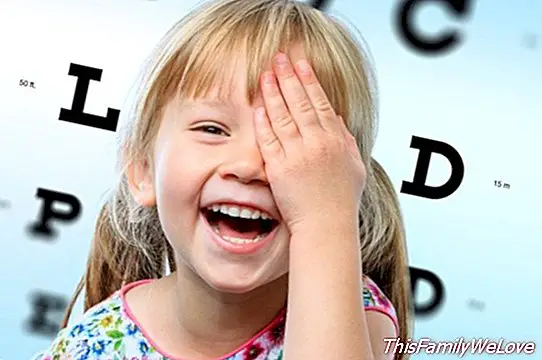The more myopic the more they grow

The lifestyle of developed countries, sedentary, in urban environments, with many hours of exposure to the screens, is causing havoc in the eyes of children. The myopia indexes are getting higher and the future, not very encouraging. As they develop it before, they are likely to end up with a large number of diopters when they are adults and may have other, much more serious vision problems. That is why it is fundamental to deal with myopia in childhood.
Spain will be seriously short-sighted for the year 2020. 33% of young people will see badly from afar. This is clear from the recent study presented by the Holden Vision Institute Brien. Among the causes of this systematic proliferation of myopia in the most developed countries are those derived from changes in our lifestyle. You spend less time outdoors, more in closed spaces, so the eye is in less situations to look away.
Adds the abuse of sight "up close", as it happens with the computer and other digital devices, and exposure to the television screen does not help either. In addition, the data shows that they are developing vision problems earlier. And this circumstance supposes a true sanitary risk to which attention must be paid.
The risks of high myopia in adulthood
Some myopic children from their earliest childhood have high chances of becoming very short-sighted adults, with problems of great short-sightedness and other medical consequences arising from this situation. Thus, several scientific studies relate a high myopia with other serious problems such as risk of retinal detachment, which is multiplied by four in the nearsighted, and reaches up to ten in the cases of large myopic patients, and with added complications in such everyday situations today as a cataract operation or glaucoma.
So addressing child myopia is not just a matter of improving the quality of life of the child, but a real investment in the health of the future adult. However, society is not sufficiently aware of the risks of childhood myopia. As Dr. Dimitry S. Mirsayafov, of the Dr. Lens clinic in Madrid, explains, this lack of awareness is compounded by the gap that exists between ophthalmologists specializing in pediatrics and those dedicated to adults, so that this idea is not perceived. set of how a childhood myopia, which in principle does not represent a complication, can pose a serious ophthalmological disorder in adulthood. "In some countries around us, the problem is beginning to be given more importance", adds this specialist with extensive experience in Russia.
Myopic when they grow older
For this specialist, it is necessary to take action on the matter as soon as possible. The first motivation is the well-being of the person. But there is also another foundation of a social nature: a population afflicted by vision problems that produce high myopia will have to face greater social and health costs. And how myopia every time they start at a younger age, the possibilities of having a future marked by a large number of great myopic people are multiplying.
The solution is not simple. The idea of changing our lifestyle habits, going back to the field, abandoning technology and limiting study time does not seem feasible, nor necessarily desirable. So we must count on that increase in cases of childhood myopia. When it arrives, there are not many possibilities for intervention either. The optimal situation is to discover the vision problem as soon as possible.
Although the view is included in some of the Reviews of the healthy child of public health services, the truth is that many parents do not find out about their children's problem until they begin to have difficulties in the classroom when attending the blackboard. By then, myopia may already have been progressing quite a lot without the parents noticing.
Except for cases with added pathologies, in children and adolescents the option of surgery is completely ruled out, since natural growth causes the eye to have not finished developing. The glasses and contact lenses will play a key role in improving the quality of life of the child. Even some systems, such as the so-called "night lenses" or ortho K (orthokeratology), have proven effective in slowing the progression of myopia, a major challenge to avoid major problems in adulthood.
It's myopic, what do we do?
At the time of making the diagnosis is essential the intervention of an ophthalmologist, since the measurement of diopters in children always requires dilation of the pupil, and it is not enough with the result obtained in an optician. From here, the parents, with the advice of the specialists, will have to choose the most appropriate correction system.
In very young children, under six or seven years, the usual is resort to glasses. Now they are manufactured with resistant materials and nothing dangerous. In older children, the use of contact lenses can be considered, with which myopia affects less in the child's daily life. The traditional contact lenses, which are worn all day, have some problems in children, since they are not always handled properly and can generate episodes of conjunctivitis and other infections if they are not always clean.
The recourse to contact lenses at night, a system with more than 20 years of experience, is a comfortable option for children. These are hard lenses that, while the child is sleeping, mold their cornea. When you take them off in the morning, see perfectly, and the effect lasts one day, so you do not lose vision during the day. Although not all eyes admit this type of lens, they are especially comfortable because children do not wear any type of correction during the day and can live with the tranquility and carelessness typical of their age. It is the parents who monitor its correct use at night.
Marina Berrio
Advice: Dr. Dimitry S. Mirsayafov, from the Dr. Lens clinic in Madrid




